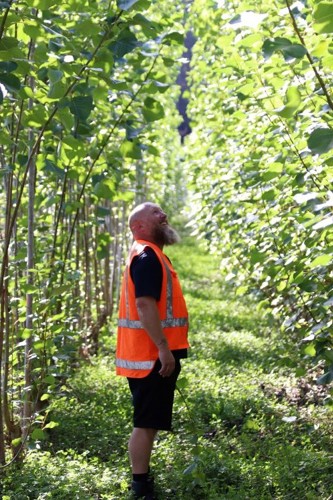Hill country heroes; poplars and willows
8 Mar 2021, 10:41 AM
Poplars and willows are the seldom-recognised heroes of Northland’s hill country properties, with a host of benefits including stabilising land and helping hold fertile soil in place instead of polluting waterways as it washes into our estuaries.
Northland Regional Council (NRC) member Rick Stolwerk says keeping fertile soils on the land is in the interest of all Northlanders and without the protection poplars and other trees afford, hills simply erode and wash away in severe rain storms.
Councillor Stolwerk says few people realise that while a natural phenomenon, eroded sediment is Northland’s biggest natural pollutant, research showing the Bay of Islands alone has lost an average of 500,000 tonnes annually for the past century.
Preventing erosion at source – for both environmental and economic reasons – is one of the reasons the regional council has invested heavily in its 16-hectare poplar and willow nursery near Mata, south of Whangarei, in recent years.
 A file (2019) shot of regional council Nursery Co-ordinator Matthew Mabbitt in the thick of it at the Flyger Rd poplar and willow nursery.
A file (2019) shot of regional council Nursery Co-ordinator Matthew Mabbitt in the thick of it at the Flyger Rd poplar and willow nursery.
“Poplars and willows really are among the unsung heroes of our regional environment,” Cr Stolwerk says. “Without the protection these trees offer, many of our hills would seriously erode in bad storms.”
The councillor (who represents the NRC’s Coastal South constituency the Flyger Rd nursery sits in) says poplars and willows offer a host of benefits.
“They stabilise pastoral hill country, increase water storage, reduce sediment runoff, improve water quality, benefit stock and enhance the farm environment.”
Every year about this time the NRC invites landowners with erosion-prone properties from Topuni north to order heavily-subsidised poplar and willow poles from the Flyger Rd nursery for the approaching winter planting season.
Orders are open now and the council’s Nursery Co-ordinator Matthew Mabbitt says a subsidised 3m poplar pole will cost $4 (+GST) and a 1m shrub willow pole $2 (+GST). (A pole typically retails for about $12.)
Mr Mabbitt says protective sleeves for the poles are $7.50 (+GST) each and depending on contractor availability, the regional council is also heavily subsidising the planting of poles for an additional $5 (+GST) per pole.
Mr Mabbitt says the council has about 7000 poles to sell and while payment doesn’t need to be made until Friday 21 May, demand usually outstrips supply, so people are being urged to order them sooner rather than later.
“Again, while payment doesn’t have to be made until 21 May, we will actually stop taking orders for poles on Friday 30 April 2020 or when stocks are all sold, whichever comes sooner.”
Anyone interested in securing poles should contact a member of the council’s land management staff on (0800) 002 004 or email: nursery@nrc.govt.nz to arrange a consultation and free planting plan.
Meanwhile, Mr Mabbitt says in a change from previous years and to save costs/comply with Covid guidelines, the council will no longer deliver poles direct to the farm gate, with landowners now able to collect them up from one of four pick up points instead.
Landowners will be able to collect their poles in the weeks beginning Tuesday 15 June (Far North), Tuesday 22 June (mid North), Tuesday 29 June (Dargaville), and Monday 05 July (Whangarei).
Councillor Stolwerk says the fast-growing trees have broad and binding root systems and have been widely used for years in Northland to prevent and control erosion and cut waterway sediment pollution.
“Although neither species is native, they’re preferable because their quick growth rates mean they can be controlling erosion within as little as just three years.” Furthermore, in summer they provide shade for livestock and in winter drop their leaves allowing the grass to grow making them ideal trees for pastural farming.
He says general information about establishing poplars and willows is also available from the council’s website via: www.nrc.govt.nz/poplars
